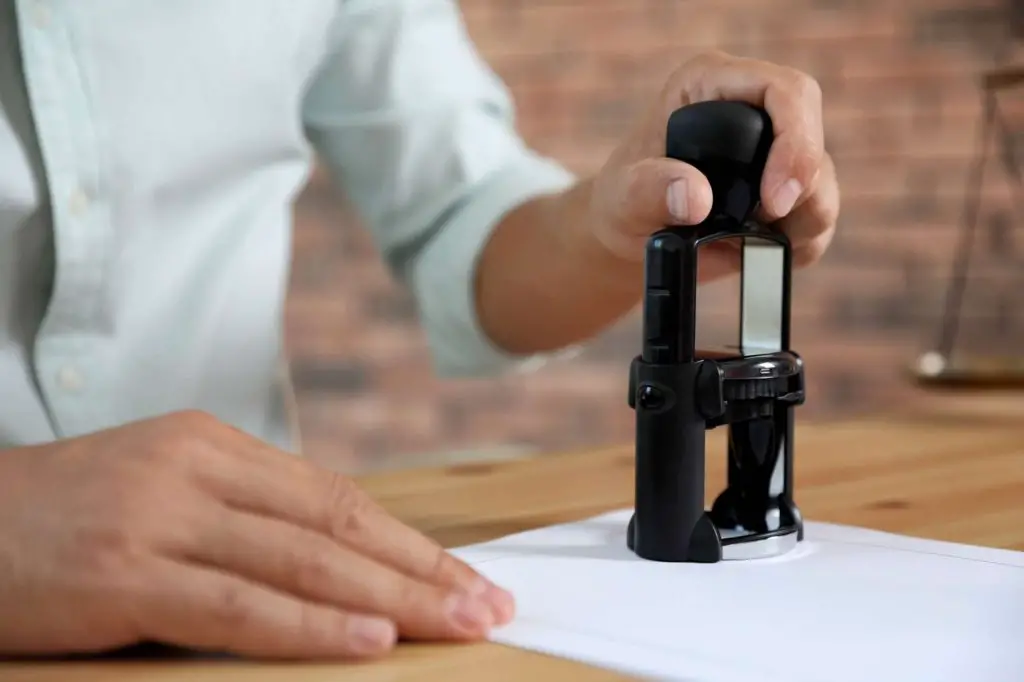(**) Disclosure: This post may contain affiliate links, meaning RealEstateCareerHQ.com will get a commission if you decide to make a purchase through the links, but at no additional cost to you.
I just finished the last few months writing the requirements to become a notary in all the different states. So I thought it would be a good idea to do a full summary here.
To become a notary loan signing agent, you must:
- Meet the eligibility requirement;
- Complete a notary training course;
- Study the notary laws;
- Pass the notary exam;
- Get a surety bond;
- Submit an application to the Secretary of State’s Office;
- Review the notary commission certificate;
- Purchase a notary seal;
- Maintain a business journal;
- Keep up with notarial best practice
Although you could work on different types of documents (i.e., POA, marriage certificate, living will), the loan signing business in the real estate market seems to be a lucrative niche. Many signing agents are earning $75 to $200 per signing assignment, while each only takes them a couple of hours.
So what does a loan signing agent do? When people are getting a mortgage to purchase a house, or they need to refinance their property, there will be loan documents involved. Your role as a notary loan signing agent is to walk through the set of loan documents with the borrower and witness them in signing the paperwork.
You would also need to verify the identity of the signers, place the notary stamp on the signed documents, then send them back to the signing services company or closing attorney.
But keep in mind that you must NOT be provide legal advice, and you cannot explain the terms of the loan documents to the borrower.
In this guide, you’ll find out the steps to become a notary loan signing agent, income updates, and FAQ about this profession. If you are trying to determine a career path or want to start a business on the side, I’m sure you will find the information valuable.
Before we start, I want to give a brief disclaimer. This post is not intended as legal advice or state/federal notary public training. It is for general information only. Please check with your state to be sure that loan signing agents are utilized in the closing process. Always follow your state’s notary laws and best practices.
Would you like to learn how to make $75 to $200 per signing appointment? You must check out the Loan Signing System from Mark Wills. (**) This is one of the best training programs for loan signing agents. Many students have achieved remarkable business success after taking this program.
11 Steps to Become a Notary Loan Signing Agent

Step 1: Meet the eligibility requirement
In most states, you need to be at least 18 years old to obtain a notary commission. You also need to be a resident or work in the state that you are applying to.
Since your role involves handling documents regularly, you must be able to read and write English.
In terms of the education requirement, there isn’t any for most of the states. As far as I could remember, only one states require their applicant to have a high school diploma or higher.
Step 2: Complete a notary training course

The purpose is to equip you with the necessary knowledge so that you can perform proper notarial acts.
But not every state requires you to take a training course. For those that do, the course load is usually between 3 to 6 hours. In some states, you will need to take the training from an education provider approved by the Secretary of State’s Office. So there could be tuition fees involved.
However, some State Offices will administer the course themselves. Some have posted their training materials either on their website or on YouTube. (i.e., New Mexico, Indiana, Idaho.) And you can view them online for free.
Step 3: Study the notary laws

The financial well-being of many people depends on the accuracy and completeness of your notary work. Although taking a training course is a good way to equip the notarial knowledge, you also need helpful resources when referring to specific notary rules.
Read the Notary Public Handbook
Some states would call it the “Notary Public Manual,” “Notary Public Study Guide,” or other variations.
But regardless of the name, a lot of states have this handbook. It is written by their Secretary of State. It covers most of the common questions about being a notary. For example,
- What is the qualification required to get a notary commission?
- What design does a notary stamp need to have?
- Do you need to keep a notary journal?
- What is the proper notarization procedure?
- When should you refuse to perform a notary act?
The content is written in an easy-to-understand manner. I also refer to those handbooks as I was writing the notary requirement in each state. They are usually available for download on the Secretary of State’s websites.
You can find comprehensive details on the Statutes Laws
When you read Notary Public Section of the Statutes Laws, it pretty much covers mostly everything you need to know about being a notary. The Statutes indeed is a good reference if you want to know more in-depth about each notary topic.
However, its wording is more technical and formal. So I would go through the handbook first, then read the Statutes only if I need further clarification.
Step 4: Pass the Notary Exam

The purpose of the exam is to see how well you know about the notary laws, procedures, and ethics.
Not every state has an exam requirement, and about only half of the states have it. I also reviewed a couple sets of exam questions. In my personal opinion, they are not overly complicated.
Rather than writing it at a test center, they are an open-book exam where you can do it at home.
They usually consists of 30 to 40 questions in the format of multiple-choices and True/False. The required passing rate is around 70% or 80% depending on the state you are getting the notary commission. And you would get the result right after writing it.
There could be an exam fee involved.
As mentioned above, studying the State Notary Public Handbook and the Notary Section of the State Statutes Law is an effective way to prepare for the exam.
Step 5: Get a surety bond

Many State Offices require you to purchase a surety bond for the term of your commission. You may get it from a licensed surety such as a notary bonding company, an insurance company, or a notary organization. You could search for them online.
The amount required typically range from $500 to $25,000. In most instances, the premium is within $100.
But keep in mind that the surety bond is to protect those for whom the notary public performs a notarization, but not you as a notary public.
If you need coverage for your practice, you should consider getting an Error & Omission insurance (E&O).
Step 6: Submit the application to the Secretary of State
The Secretary of State is responsible for appointing and commissioning notaries. You need to submit a Notary Public Application to them.
Most of the application questions are pretty strict forward—for example, your name, business address, background info. It’s better to check that the name you put on the application will be the same as when you are notarizing documents.
Take an Oath of Office

The oath is an affirmation that you agree to assume the notary public’s duties and comply with the State notary laws. You must sign the application and take an oath in the presence of a notary public in your state.
The notary will also sign and affix a stamp on the form.
Submit the notary public commission application

Once all the documents are ready, you may submit them to the Secretary of State’s Office. There is an application fee, and they are usually less than $100.
Some states allow you to submit online. I strongly encourage you to use this option as this will speed up the process. Also, less paper usage is good for the environment.
If an online option is unavailable in your state, you can mail them to the Secretary of State’s Office.
Step 7: Review the notary commission

Typically speaking, their processing time is 5 – 10 business days after they receive the application.
Once your application is approved, the Office will send you the notary public commission certificate. You should review and make sure all the details on the certificate are correct. (e.g., your name, county of residence, the term of commission).
If there is any inaccuracy, you need to notify the Office asap.
Furthermore, some states require you to file the commission and surety bond in the County Clerk’s Office. They usually will need you to complete this within 30 to 45 days of receiving the certificate.
Step 8: Get a notary stamp

In some states, it is mandatory for notaries to use an official stamp. It is an important business tool that ensures you won’t leave out any required details. It indicates the signing agent as an impartial witness.
You may purchase the notary stamp from an office supplies store. Its design must comply with the state regulatory rules.
For example, most states would require the seal to contain the following:
- Your name exactly as it appears on the commission (You must not include titles such as Mr., Mrs., Ms., Doctor)
- Your commission number
- The expiration date of your commission
- The county that you are located
- The stamp’s image must be sharp and legible printed so that it can be reproduced under photographic methods
Furthermore, there would be a specific requirement for its size and the border’s shape. To prevent fraudulent activity, you must always keep the stamp in a secure place.
Step 9: Maintain a notary journal

Maintaining a good record of your notary acts is an essential part of good business practice. It could serve as proof that you have taken reasonable steps to identify the signer of a document.
If your journal is maintained in a physical format, you should have one bounded with numbered pages. You may find it at stationery, office supply stores, or through notary associations.
Whereas for a journal in an electronic format, it needs to be a permanent, tamper-evident. Make sure that it is complying with the rules in your state
In the notary journal, you may consider recording the following items in each entry:
- What is the the date of the notarial act performed?
- What is the notarial act?
- The identifying information of the signer
- Other details which you believe would be useful when referring to this notarization
Step 10: Register to perform electronic and remote online notarization

I like states that have the option for notaries to work digitally. Doing so could bring you great convenience to streamline your notary practice. But let me explain the difference between Electronic Notarization and Remote online notarization.
Electronic notarization, also known as “e-notarization,” is where the signings and document transmission can be done electronically. But you’ll still need to meet the signer in-person to verify their identity.
Remote online notarization (RON) gives you the convenience not to be physically present with the signer. Instead, you would verify their the signer’s identity through video and audio conference.
To perform electronic or remote online notarization, you’ll need to:
- Hold a traditional notary commission certificate;
- Get an electronic notary signature and seal;
- Select an approved technology vendor;
- Submit an e-Notary or RON application to the Secretary of State’s Office and pay the registration fee;
- Maintain an electronic journal for your digital notarial acts;
Some states could have an additional requirement, such as completing an e-notary training course. Also, not all states allow electronic or remote online notarization.
At the time I’m writing the post, many states imposed emergency rules, which allows remote online notarization.
However, this could be a temporary measure. Whether they would revert to in-person notarization afterward is unknown yet. Therefore, you should check with the Secretary of State’s Office.
Can a notary conduct business solely from a home office? Check out this post to find out.
Step 11: Keep up with notarial best practice
Continuing education is critical to being a notary signing agent. Rules and regulations would change over time. Also, there will be new technology to advance your business practice. A good way is to take high-quality courses from a trusted provider.
Learn to earn as a Loan Signing Agent
Without sufficient income, you are just doing it as a hobby and not a real business. The first step you should take is to learn how to build a “PROFITABLE” notarial practice.
But this could take years of trial and error in coming up with a feasible strategy. Rather than reinventing the wheel, a MUCH better way is to learn from someone who has done it before successfully.
Mark Wills is a top-notch coach for notary signing agents. He developed the Loan Signing System (LSS) training program, where many of his students have achieved massive success. Some can earn great money as a side-gig, where some are earning over six-figures every year.
You may click here to check out his training program. (**)
Advance your credential by becoming an NNA Certified Notary Signing Agent

The National Notary Association (NNA) is one of the largest associations and most recognizable for notaries. They provide regular updates, training and networking events to the members.
Getting the NNA Certified status can show to title and escrow companies that you are maintaining a high standard as a signing agent. Thus, strengthen their trust and confidence in your signing services.
>>Here is a review I wrote about the NNA Certified Notary Signing Agent Program<<
In there, you can find an exclusive interview I had with Melina Fuenmayor. She will share with you her thoughts in obtaining the certified credential.
A Table Summary to Become a Notary
| Notary Course | Exam | Surety Bond | Term of Office | Fee (s) | |
|---|---|---|---|---|---|
| Alabama | No | No | $25,000 | 4 years | Varies from county to county |
| Alaska | No | No | $1,000 | 4 years | $40 |
| Arizona | No | No | $5,000 | 4 years | $43 |
| Arkansas | Optional for notary; Mandatory for eNotary | Yes | $7,500 | 10 years | $20 |
| California | 6 hours course | Yes | $15,000 | 4 years | $20 |
| Colorado | eLearning notary training | Yes | No | 4 years | $10 |
| Connecticut | Read the CT Notary Public Manual | Yes | No | 5 years | $120 |
| Delaware | No | No | No | 2 years on the first term; then 2 and 4 years options upon renewal | $60 |
| Florida | 3 hours course | No | $7,500 | 4 years | $39 |
| Georgia | No | No | No | 4 years | $36 to 51 |
| Hawaii | No | Yes | $1,000 | 4 years | $140 |
| Idaho | Optional (Free online course available) | No | $10,000 | 6 years | $30 |
| Illinois | No | No | $5,000 | 4 years | $10 |
| Indiana | Free online course | 30 questions; Required passing score 80% | $25,000 | 8 years | $10 |
| Iowa | Yes | No | No | 3 years for resident of Iowa, 1 year for resident of bordering state | $30 |
| Kansas | No | No | $7,500 | 4 years | $25 |
| Kentucky | No | No | $1,000 | 4 years | $10 |
| Louisiana | Optional | Yes | $10,000 | 5 years | 35 filing fee; $100 exam fee |
| Maine | No | Yes. Questions in the application | No | (7 years for Maine residents;) (4 years for New Hampshire resident) | $50 |
| Maryland | Yes | Yes | No | 5 years | $11 |
| Massachusetts | Must read through Chapter 222, “Justices of the Peace, Notaries Public and Commissioners” of the General Laws. | No | No | 7 years | $60 |
| Michigan | No | No | $10,000 | 6 years | $10 to $20 |
| Minnesota | No | No | No | 5 years | $120 |
| Mississippi | No | No | $5,000 | 4 years | $25 |
| Missouri | Yes | Yes (30 multiple-choice questions) | $10,000 | 4 years | $25 |
| Montana | Yes | Yes | $25,000 | 4 years | $25 |
| Nebraska | No | Yes | $15,000 | 4 years | $30 |
| Nevada | 3-hour course | Yes | $10,000 | 4 years | $35 |
| New Hampshire | No | No | No | 5 years | $75 |
| New Jersey | No | No | No | 5 years | $25 |
| New Mexico | 17 minutes of training video (optional) | No | $10,000 | 4 years | $20 |
| New York | No | 40 multiple-choice questions; Required passing score 70 | No | 4 years | Filing fee$60; Exam fee $15 |
| North Carolina | 3-hour course | Yes (required passing score 80%) | No | 5 years | $50 |
| North Dakota | None | None | $7,500 | 4 years | $36 |
| Ohio | 3-hour course | Yes (30 multiple-choice questions) | No | 5 years | $15 for application fee; Course & exam fee for $130 |
| Oklahoma | No | No | $1,000 | 4 years | $25 |
| Oregon | Yes | Yes | No | 4 years | $40 for application fee; $40 for oath of office |
| Pennsylvania | 3-hour course | Yes | $10,000 | 4 years | $42 for application fee; $65 for exam fee |
| Rhode Island | Yes | Yes | No | 4 years | $80 |
| South Carolina | No | No | No | 10 years | $25 |
| South Dakota | No | No | $5,000 | 4 years | $30 |
| Tennessee | No | No | $10,000 | 4 years | $12 |
| Texas | Optional (Free online course available) | No | $10,000 | 4 years | $21 |
| Utah | No | Yes | $5,000 | 4 years | $95 ($55 for application; $40 for testing) |
| Vermont | Yes (Starting Feb 1, 2021) | Yes (Starting Feb 1, 2021) | No | 2 years | $15 |
| Virginia | No | No | $200,000 | 4 years | $45 for application fee; $10 for filing fee |
| Washington | No | No | $10,000 | 4 years | $45 |
| West Virginia | No | No | No | 4 years | $52 |
| Wisconsin | No | 30 questions; required passing rate 90% | $500 | 4 years | $20 |
| Wyoming | No | Optional | $500 | 4 years | $30 |
If you want to succeed in the loan signing industry, you must check out this loan system training program. If you review the testimonials of his students, you’ll be amazed at how the notary career changes their life after they learned from Mark Wills. (**)
How much does it cost to become a notary?

It typically cost under $250 to become a notary public. This includes the application fee, surety bond, notary stamp, journal.
There could be other expenses involved such as notary training course, exam registration, travel expenses, car maintenance, auto insurance, E&O coverage, electronic and remote notary technology, laptop and other business supplies.
Can a felon be a notary?

Having a conviction for a felony may impact the application to become a notary. The Secretary of State needs to make sure that you are a person with credibility, truthfulness, and integrity to fulfill the responsibilities of the position.
When you are applying for a notary commission, you must report all convictions, provide all required documentation such as a detailed written explanation, and certified court documents. In some states, the Office will conduct a background check on the applicant.
Some State Offices have a stringent rule where they will disqualify any applicants with a felony. Whereas, others would consider the severity and nature of the conviction. For example,
- Is the misdemeanor related to fraud?
- When did it happen?
- Has it been pardoned?
How long does it take to become a notary?
It typically takes 5 to 10 business days to become a notary. To speed up the registration process, you should submit the notary public application online whenever possible.
How to renew notary commission?

The notary commission is not renewed automatically. You need to apply for a new commission before its term ends. The notary commission is not renewed automatically. You need to renew it before its term ends. The notary commission has a four-year term in most states. However, I have seen term as short as two years and a long period term as ten years.
Although, the some Secretary of State’s Offices will send you a courtesy reminder, it is your responsibility to ensure that you have an active commission.
The steps are the same as you were applying for the initial application. To ensure that you maintain updated knowledge on the notary laws and best practice, some State Offices require you to complete continuing education before each renewal.
Some states have additional requirements to become a loan signing agent
To add another layer of protection for consumers against the improper conduct and negligence of title insurance producers, if you plan to become a loan signing agent in Indiana, Maryland, or Virginia, you will need to obtain the Title Insurance license.
This requires you to complete the pre-licensing education, submit the application, and pay the registration fee.
Furthermore, becoming a notary in Puerto Rico has one of the most stringent rules, where they are all required to be practicing lawyers.
I have more questions about being a notary public, where could I obtain more details?
You may contact the Secretary of State’s Office. Also, I have written guides to become a notary public in all different states. You may click here to find out the requirements in your state.
A real life story of a successful notary public and loan signing agent

What’s a better way to learn about the business than learning from someone actually working in it! Here is an exclusive interview I conducted with Luisa Cook. She is a successful Certified Notary Public and Loan Signing Agent.
In there, she shared her journey and business strategy in running a notary and signing business. I’m sure this could help you to understand more about the notary career.
Related Questions about being a Notary Loan Signing Agent

1) How much can you make as a notary signing agent?
The average Notary Signing Agent salary is $37,757. It typically falls between the range $36,885 and $48,027. (+)
As mentioned earlier, you could work on different documents, but the loan signing in the real estate market could be a lucrative niche.
Can you make over $10,000/month as a loan signing agent? Be sure to check out our notary earning guide. You’ll find a case study where a loan signing agent has built her business to such a successful figure.
(+) Source: Salary.com – Sept 25, 2020
2) Is there demand for notary loan signing agent?
As long as people are obtaining mortgages or refinancing their homes, there would be a demand for notary loan signing agents.
All originated mortgages in nationwide
| YEAR | RECORDS |
|---|---|
| 2017 | 7,339,057 |
| 2016 | 8,377,907 |
| 2015 | 7,404,258 |
| 2014 | 6,039,826 |
| 2013 | 8,706,657 |
| 2012 | 9,783,966 |
| 2011 | 7,095,262 |
| 2010 | 7,863,337 |
| 2009 | 8,950,936 |
| 2008 | 7,177,262 |
| 2007 | 10,441,545 |
Source: Consumer Financial Protection Bureau – Home Mortgage Disclosure Act (HMDA) (Oct 4, 2020)
Furthermore, some states are “Attorney states,” which means only an attorney can handle the closing paperwork. Whereas, others are “Escrow States” where a loan signing agent can do the work.
So if you are working in an escrow state, there is a certain degree of advantage for your loan signing business.
So if you are working in an escrow state, there is a certain degree of advantage for your loan signing business.
However, it is still possible for a signing agent to excel in an attorney state. Here’s another post I wrote. In there, you will find an inspiring real-life story where some went from barely making end needs to $10,000/month as a Notary Signing Agent in an Attorney State!!
3) How to become a mobile notary?

Some signers cannot travel to your office in signing the documents, and they do not have the technology to perform the remote notarization. In such a situation, there would be a demand for a mobile notary. In short, a mobile notary is merely a notary that travels around in meeting signers.
To become a mobile notary, you must:
- Register with the Secretary of State as a notary. This is basically the same notary commission certificate, as discussed earlier. You don’t need to get a new one.
- Have ease of transportation. It is better to have your own car so that you could conveniently drive between appointments.
- Setup essential equipment: A mobile printer and an approved electronic notarization platform allow you to work on the documents whenever and wherever. You may check out our resource page for amazingly helpful tools that could streamline your business.
If you are reading up to this point, I bet you must be interested in the notary signing profession. But why reinvent the wheel when there is a proven system that works? Many students had great success following the Loan Signing System (LSS) from Mark Wills. You may click here to check it out yourself. (**)
Disclaimer: The information in this post is for general information only, and not intend to provide any advice. They are subjected to change without any notice, and not guaranteed to be error-free. Some of the posts on this site may contain views and opinions from individual not related to JCHQ Publishing. They do not necessarily reflect our view or position.
(**) Affiliate Disclosure: Please note that some of the links above are affiliate links, and at no additional cost to you. Our company, JCHQ Publishing will earn a commission if you decide to make a purchase after clicking on the link. Please understand that we include them based on our experience or the research on these companies or products, and we recommend them because they are helpful and useful, not because of the small commissions we make if you decide to buy something through the links. Please do not spend any money on these products unless you feel you need them or that they will help you achieve your goals.
Reference:
- First American Title- Your Guide to Real Estate Customs by State (source)
- American Society of Notaries – Temporary Notary Procedures During COVID-19 Pandemic: State Emergency Orders/Guidance (source)
- Salary.com – Notary Signing Agent Salary (source)
- Consumer Financial Protection Bureau – Home Mortgage Disclosure Act (HMDA) (source)

